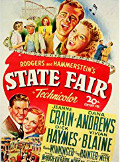
Directed by
Walter Lang
100 minutes
Rated PG
Reviewed by
Bernard Hemingway

State Fair (1945)
Richard Rodgers and Oscar Hammerstein II’s first collaboration, their only for the big screen, did not start life as a stage play but rather it was a highly tongue-in-cheek remake of a 1933 Will Rogers movie, its Norman Rockwell-ish portrait of rural innocence (it is set in Iowa) being strangely disturbed by its insistent sexual preoccupations.
Set in the days when the State Fair was already past its heyday as the biggest event in the farmer's annual calendar it tells the story of the Frake family as Mom (Fay Bainter) submits her pickles and mincemeat to the judges, Pop (Charles Winninger) frets over Blue Boy, the hog with which he wants to win Grand Champion of the show, and children Marjy (Jeanne Crain) and Wayne (Dick Haynes) go in search of romantic adventures, the former finding them with a newspaper man (Dana Andrews), the latter with a come-hither soubrette (Vivian Blaine).
Although the Technicolor chocolate-box look of the film which was shot almost entirely in the studio or Fox's back-lot has a certain appeal, Lang does little with the staging and the songs are largely unremarkable with the exception of the classic ‘It Might As Well Be Spring’ which won the Academy Award for Best Song of the Year and is used as a refrain throughout the film. There is also minimal choreography despite Hermes Pan's name in the credits
There are, however, two incongruities of note. One Is the almost continuous preoccupation with sexual coupling from Blue Boy’s rutting at the sight of a comely sow to Mom and Pop joshing each other over their younger friskier days. As for Wayne and Marjy they’re about to burst with libidinally-charged tension. The other oddity is the twinning of Marjy with the much older newspaperman and the seemingly much younger Wayne with a good-time showgirl as part of a broad country/city opposition.
We are never told how old Marjy and Wayne are supposed to be but I am guessing late teens. As Wayne’s story starts with his trying to get his revenge on a dodgy carnie (Harry, then Henry, Morgan) who gypped him out of a pearl-handled revolver the previous year, this should be an index of his youthfulness. But then why would Blaine’s married woman-of-the-world be interested in him? The film rides roughshod over this problem by casting a 26 year old Haymes in the role and essentially playing of his popularity as a Crosby-esque crooner (admittedly teenagers were yet to appear) with not the least attempt to pass him off as a farm boy. Somewhat ironically the 24 year old Blaine still seems older than him
The problem is even more grievous, albeit in the opposite direction, in the case of Andrews’ toffee-apple eating newspaperman. The actor was 45 at the time so assuming Marjy to be 18-19 (Crain was 20) where would be his appeal for her? Not to mention the dodginess of his for her. Once again it all just seems to come down to sex, the sub-text which stands in pointed contrast to Mom’s sentiment, expressed when her mincemeat wins Best In Show, “What more could a woman ask for?” she sighs with satisfaction.
Although as a musical State Fair is unremarkable, visually it is treat and as a Trojan Horse of sexual frustration it has some appeal.
FYI: The film was re-made with significantly less charm in 1962 with Pat Boone, Bobby Darin and Ann-Margret.
Want something different?





